Duolingo Review — A Good Use of Your Time? 2024
Summary of This Review:
Duolingo is a popular online computer game with a small foreign language learning component.
Because the first design goal of Duolingo was to be a “fun game”, it has just enough language learning material to keep you thinking that you are really learning your new language when in fact many people who use Duolingo for the recommended five to twenty minutes per day are forgetting as much as they learn each day to yield no net learning.
Duolingo used to advertise that you could “learn a language for free in just five minutes a day”[1] fortunately (perhaps due to many reviews like this one) they no longer are making that particular bold faced lie, but unfortunately their program is intrinsically inefficient compared to programs that were designed to only be great learning tools without the design overhead of being a fun game as their first requirement.
Because Duolingo is so inefficient by design, you should plan to spending four to five hours per day on Duolingo if you plan to to learn a little bit of your new language. If you do spend four to five hours per day with it, you will learn a little bit, but nowhere near the amount you could have learned by spending that time studying with more efficient study methods.
Are You a Duck?
I will explain why you might not want to learn Spanish with a program that thinks you should study phrases like, “I am a duck who speaks English.” That’s my favorite funny phrase from the Duolingo Spanish program, but funny is not the same as useful.
I will cover alternatives that will be better for some language learners. I’ll speculate on who is really paying for Duolingo if you aren’t.
The Most Carefully Researched Duolingo Review
In the review below, you will read some things that seem unbelievable at first. But every claim has been carefully proven from highly credible sources. If you don’t believe me, read the footnotes.
Teach a Language — Go to Jail
I’ll also tell you about the time when foreign language teachers were imprisoned in America for four years, simply because they were language teachers.
Will Duolingo Work for Me?
Duolingos’s methods can work, but you’ll need to spend a lot of time on it, just like you would with your old Spanish textbook from high school. I’d suggest four to five hours per day.
If you are a beginner or lower intermediate and are looking for a more time-efficient program, I suggest clicking on the flag of the language you want to learn below and try a more time efficient learning method right now.
If you are an advanced student, then we recommend Yabla even though they are a competitor and we don’t get a commission by recommending them. If you need an audio only program so you can learn in your car or while walking and not looking at a screen, then Pimsleur is good too.
We have a comments and questions area at the bottom of this page, so please do leave your thoughts there. I would especially love to hear from anyone who has learned a language well by ONLY studying with Duolingo and nothing else.
If you like this review, please share it with your friends Facebook, Twitter, or your favorite social media.
What Is Duolingo?
Duolingo is a language learning website and app. The site used to claim that “you can learn a language in five minutes a day.”[2] It currently claims that their program has 74 million monthly users.[3]
The first claim was clearly a lie, and the second one might be too, for all I know.
Duolingo has taken boring language textbooks with methods that don’t work very well in paper books and turned them into computer games that still don’t help you learn a language very well.
The History of Duolingo and Why It Matters
Duolingo[4] was founded in 2009 by a serial entrepreneur named Luis von Ahn, with his co-founder Severin Hacker.
Von Ahn’s claim to fame is that he was the creator of reCAPTCHA. It was and still is an anti-spam device that web developers put in front of forms that they didn’t want to get filled up with useless content by the spammers on the web.
Von Ahn claimed that people who used reCAPTCHA were helping digitize books with words that weren’t easily readable by computers when they were scanned. He called it a “massive-scale online collaboration.”[5]
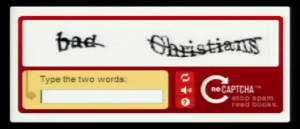
An example of reCaptcha from von Ahn’s TED talk. This didn’t stop spam, it just made it more expensive.
Cashing In on the Labor of Others
Von Ahn later made his first millions by selling reCAPTCHA to Google for US$26 million. In 2015, a Massachusetts woman sued Google for using free labor to scan books and newspapers.[6]
Software Can Be Good or Bad
In his TED talk, von Ahn claimed that more than 750 million people had solved one of his captchas.[7] However, what was the price that those people paid? Certainly, they were subjected to a huge amount of unnecessary stress, which quite possibly led to earlier graves.
Software developers need to remember the phrase, “First Do No Harm,” just like doctors do. ReCAPTCHA in the form that von Ahn originally released was harmful software.
Why the Founders Matter
The history of Duolingo’s founders is important to language learners because companies are reflections of their founders for a very long time.
The reCAPTCHA device was founded on a lie (“help digitize books”) that made it sound like you were having to type those hard-to-read letters in a form for the public good.
Where Are the Books?
So where are the libraries of accurately digitized books that 750 million of us helped digitize?
And if accurately digitizing books was such a valuable business, then why did Google redesign reCAPTCHA (after they bought it) into the current, much less stressful, “I’m a Human” checkbox?
Why reCAPTCHA Was Worth Millions
Luis von Ahn made his first fortune by getting millions of people to type difficult-to-read words into their computer. And that company, which had either little or no revenue, was still worth millions to Google.
Why was it worth millions? Because it was installed on millions of websites, just before checkouts and registrations and ticket sales and things like that.
And the knowledge of what millions of humans are doing on the web (especially when those humans are buying and registering and commenting) is a very valuable thing to big marketers and big government.
It’s called “Big Data.”
Why Is Duolingo Valuable?
ReCAPTCHA was a stress-inducing blot on the web landscape, based on the lie that you were helping digitize books for the public good.
On the other hand, Duolingo is friendly and warm and fuzzy, and it pulls you in with the lie that you can learn a language in only five minutes a day. It keeps you coming back with the levels and the badges and comments on the message boards.
You see, human attention is very valuable, especially when you are talking about the attention of millions of humans with credit cards.
Human Attention On the Internet Is Like Location in Real Estate
Let me explain this by comparing the internet to real estate. In real estate, commercial locations with more people going by, or richer people going by, are more valuable to businesses than other locations with less traffic.
The internet equivalent of that is to develop a website with a LOT of users (and richer users), so you can show them ads, and sell products on Amazon, and mine the data about your users to sell to marketers and other interested parties.
A site that attracts the positive attention of millions of people with credit cards is extremely valuable. That’s why Duolingo is a very valuable website.
Does Free Forever Really Mean Free Forever?
I first heard about Duolingo in 2011, when the company got its first big publicity.
Back then, the homepage said, “With Duolingo you learn a language for free, and simultaneously translate the Web.”[8] I thought it was the stupidest idea that I had ever heard and promptly forgot about it.
Apparently, most people didn’t like it, so the banner headline on the homepage was soon changed to “Duolingo. Free language education for the world,” and later it was changed to “Learn a language for free. Forever” and as I write this in May of 2024, their home page banner says, “The free, fun, and effective way to learn a language!”
So Duolingo’s free forever, didn’t end up meaning something like, “The sun will come up in the east forever.” It was a lot more like “I‘ll love you forever,” which tends to be a lot shorter kind of forever.
Super Duolingo – Pay to Get Rid of the Ads
This used to be called Duolingo Plus, but someone in their marketing department apparently thought that Super Duolingo would sell better and maybe it is selling better.
When you use the “free” version of Duolingo you are actually paying for it by watching ads as your form of payment to use their program. If the ads annoy you enough, you can pay a monthly fee to get a version without the ads, and NO, there are no additional lessons in the paid version, just the same lessons with no ads.
Is it worth the money? You decide.
Duolingo Finally Finds Business Model
When Duolingo was started, the founders said that they planned to make money by having people translate the Web and then charging customers, such as CNN, for translation services.[9]
It turns out that companies weren’t interested in having their documents translated by millions of language learners, so that business plan was abandoned.[10]
Currently they are making money by charging a subscription fee that people pay to get rid of the bothersome ads and apparently they are now profitable. They also make money by offering English competency testing as described below.
English Testing for $49.00
Language learning on the Duolingo site is still free (well actually advertising supported, but you don’t have to pay for it), but the company now says it makes money by selling language competency testing for a fee, in competition with companies like International Language Testing and ALTA.[11]
There is actually a very large market for English language competency testing and there is certainly nothing wrong with Duolingo competing in that market. People whose native language is not English often need to prove to a potential employers or universities, that they have achieved the needed level of proficiency in English.
Duolingo’s English test is semi-automated with the applicant being asked to upload images of his or her ID, then take pictures and video samples of themselves in response to questions. Some parts of the test are very similar to Duolingo games, and there are also written questions that you must respond to in writing. You have to respond to some questions by recording short videos of yourself answering open ended methods.
Racially Sensitive Questions?
Since Duolingo is primarily in the business of data mining, they haven’t been able to resist asking their test takers questions that are utterly irrelevant to proving their competence in English such as “What race are you?” Someones race has roughly zero to do with the competency they have developed in English. Who wants to know the answer to this question and how much are they paying for it?
A person’s linguistic background may have a lot to do with how difficult it was for them to achieve a given degree of competence in English, but once competence or the lack of competence is proven, race is really an irrelevant question and they shouldn’t be asking.
Perhaps you’ve heard this quote: “I have a dream that my four little children will one day live in a nation where they will not be judged by the color of their skin but by the content of their character.” Martin Luther King, Jr.
So there is Duolingo, judging people by their race instead of simply measuring their competence in English. Shame on you Duolingo.
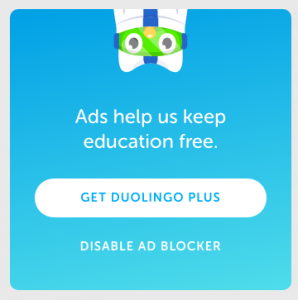
At the moment, Duolingo is selling ads. They also now offer Super Duolingo, an ad free but otherwise identical version of the program.
The Dark Side of Language Learning
Here’s an important question: What’s really behind the free Duolingo platform? Who else, besides you, would like to know what languages you know and how well you know them?
Of course, big marketers and big government are always interested in knowing what you know.
And while it seems fairly innocent that Air France might like to know how well you have learned French this year, others may want to know what you know with a much less innocent intent.
Are Intelligence Agencies Interested?
Is the CIA interested in how well you know a foreign language? I think so, and so does NBC News.[13.1]
Do you know a foreign language and would you like to work for the CIA? Their official careers web page says, “New employees who already possess excellent foreign language skills may be eligible for a significant hiring bonus.”[13.6]
What Do the TOEFL Test Makers Do With Your Data?
ETS, the creators of the well-established English competency test called TOEFL, says, “We make (and reserve the right to make) all lawful, worldwide uses of Personal Information subject to this Policy and applicable law.”[14]
Selling your competency data to any intelligence agency with a budget is a lawful use. If you don’t like that, then don’t use ETS or Duolingo.
Historically, when times change and the winds of war or oppression blow over a country, educated people (and if you know more than one language, you are educated) were often singled out for imprisonment or death.
Teach Japanese and Go to Prison for Four Years
Note that Japanese language teachers in Hawaii were singled out and jailed by the United States government during WWII.[15]
Also remember that in the 1970s in Cambodia, everyone who was educated was murdered.[16]
And of course, the Soviet Union had several pogroms against the intelligentsia.[17]
Should You Trust Duolingo?
Do you trust Duolingo to share your competency data only with you, and not sell it to all the intelligence agencies and others who want to know?
Do you think that perhaps “Learn a language for free forever” means, in Duolingo’s case, either until they burn through their investor money or until they figure out how to get the CIA or the FSB to pay for it?
Do you know where the data collected from the Duolingo platform goes and how it will be used in the future?
Have you read their “Terms of Use”?
You decide.
How Well Does Duolingo Work to Learn Spanish?
When you first sign up with Duolingo, you are asked what kind of learner you are, and you’re asked to set a daily target study time that varies from 5 to 20 minutes.
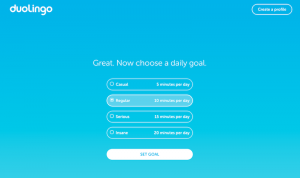
Duolingo’s goal is to get you to visit the site every day so you count in the daily user stats. Any lie that gets you to do that will serve their purpose.
After you set your target study goal, you begin typing and translating (remember, their first goal was to sell your translations). Occasionally you’re asked to speak a phrase in Spanish or your new language into your microphone.
The voice recognition algorithm isn’t very picky, so as long as you say something that has the right number of syllables and the right stress, Duolingo will grade your answer as correct, and you can go to the next phrase.
Because Duolingo was built so that the company could get paid as you translated documents, it shouldn’t surprise you that the program will have you do a lot of writing and translating.[19] Of course, there is nothing wrong with learning to translate as long as you want to learn to be a translator.
Because with Duolingo you spend your study time typing in the blanks and saying the occasional foreign-language phrase into your microphone, the efficiency of their language teaching method is low.
It’s Like Your High School Spanish Class
Essentially, Duolingo is a computerized and gamified version of a simple foreign language workbook that did not teach you much Spanish back in high school. And, just as you found in high school, you won’t learn much unless you spend a lot more time studying than five minutes per day.
Learning with Duolingo is slow and inefficient. But as with many other not-very-good methods, you can learn something if you put enough time into it.
With Duolingo, you will form low-quality memories that will fade quickly. Most language learners don’t realize that it is possible to create high-quality memories that will fade slowly and put these memories into their long-term storage.[20]
Having said that, if you put in enough time studying with Duolingo (and practice as much as you can), you will probably learn something. But you will have to spend a lot more than five minutes per day studying.
I’d suggest that you spend three to four hours per day with it. Boy, that would be a terrible headline!
What If You Don’t Like Games?
What if you are a person who doesn’t like games, and of course not everyone likes games. What if you would prefer to use a program that was faster to learn Spanish, German, or French and didn’t have all the overhead required to turn language learning into a game?
For people who are highly conscientious, I recommend trying the free demo that you can try if you click on the flag of your next langauge below.
The program below will work very well for anyone who already knows how to form effective study habits.
Fortunately if you don’t yet know how to form effective study habits, they are easy to form when you understand a little bit of the science behind it.
Everyone who tries the free demo below and reaches their study goal for today, will get a free report on how to easily form new language study habits.
Stupid Phrases That Make the Teachers Laugh
If you ask language teachers to make language lessons without giving them proper supervision, they get bored in a hurry. To counteract their boredom, they start making silly lessons to entertain themselves.
Duolingo has a huge number of truly stupid phrases that the teachers who wrote the course probably thought were funny. These vary from phrases about ducks who speak English to phrases that will help you when you need to talk to your cat, or even when your cat needs to talk to you.
What I Like About Duolingo
Duolingo has a color-coded fade built into the lessons. The colors fade as the time you studied the lessons moves further into the past. This is good because it reminds you that language competence is a “use it or lose it” skill. Every memory that you don’t review will fade.
Language learning is a neuromuscular skill, similar in some ways to learning a new sport.[21] You have to grow your foreign language muscles to learn a language. This is possible to do in Duolingo, but probably most people don’t.
How to Use Duolingo
You need to say the foreign language phrases OUT LOUD immediately after the teacher says them. Typing them doesn’t give your mouth muscles the practice they need.
Remember, for the most part you are not trying to learn how to type a new language, you are trying to learn to speak it and understand it. If you want to learn to speak it, you have to open up your mouth and speak.
What Duolingo Does Exceptionally Well
Two essential features are needed for any language learning program to work. It has to work technically when people diligently apply it, and it has to work psychologically for some portion of the language-learning public that wants to use it.
Duolingo falters technically. Its methods are not very good, and it doesn’t work very well even if applied diligently.
But what the creators of the site have done exceptionally well is to build a system that pulls people back psychologically.
Other companies with systems that work better should gamify their language learning systems to solve the psychological problems of language learning.
Good Reminder Emails
The best feature of Duolingo is its daily reminder emails. I highly recommend choosing the daily reminders, clicking on them each day to keep them coming, and then using a more effective language learning program for your studies like Anki, Memrise, or Language101.com.
You won’t learn quickly from Duolingo, but it still can be very useful if it pulls you back to daily language study. Use the following alternative programs that make better use of your study time and will help you form long-term memory storage.
You’ll Probably Like My Other Reviews
If you like this review you will probably also like my reviews of other language learning products. Pimsleur[22] is a good program for beginners that has a much longer list of languages than what Language101.com offers. Yabla is an excellent program that we highly recommend for intermediate to advanced learners.
I also recommend Fluenz for people who need to do preparation for a language academic test like a CLEP test.
Rosetta Stone, has a fundamental design mistake that they have been marketing very well for a long time.
If You Are a Beginner — Try These Free Lessons
If you need to learn one of these languages below, click on the flag of your next language and try the free lesson for 30 minutes right now.
So What Do Other Experienced Language Learners Say about Duolingo?
So here are some quotes from what some notable polyglots have had to say about Duolingo. The links to their Duolingo reviews are at the bottom of the list of citations.
“I have a huge problem with Duolingo. The biggest problem with Duolingo is, it’s memorization. It’s 99.9% memorization. All you are doing is memorizing words and phrases, etc. Memorization is not comprehensible input. In fact, you could memorize the entire dictionary. You could memorize the whole Spanish dictionary, the French dictionary, Arabic dictionary, etc. and you would still not speak the language. It just doesn’t work that way.”
Jeff Brown, polyglot and full-time language instructor
“I would recommend it as a secondary learning aid. It is great to use when you have 10-20 minutes to kill, like while on a commute, as you will certainly learn something in the target language.”
Conor Clyne, polyglot, Language Tsar.
“The learning tasks at Duolingo are pleasantly presented and cleverly gamified. Duolingo tells us we can learn a language in five minutes a day, which I sincerely doubt. The user gets frequent rewards for correct answers. A variety of messaging is used to persuade us not to quit, but it didn’t work for me. I need meaningful content.”
Steve Kaufmann, polyglot
Conclusion:
Duolingo claims that you can “learn Spanish in just 5 minutes a day. For free.” While you can learn some Spanish with Duolingo, it will take you a lot more than just five minutes per day. Plan on spending at least fours hours per day with it. Also read Spanish books and watch Spanish movies to become fluent.
References:
1. “Learn Portuguese in just 5 minutes per day. For Free.” Duolingo. Retrieved November 11, 2019.
2. Ibid.
3. Craig Smith, “By the Numbers: 17 Amazing Duolingo Facts and Statistics (2019).” DMR: Business Statistics, Fun Gadgets. Last updated August 30, 2019. Retrieved Nov. 14, 2019.
4. Duolingo website is available here: https://www.duolingo.com/
5. L. von Ahn, Massive-scale online collaboration. TEDtalks.com, video, April 2011. Retrieved March 23, 2018.
6. D. Harris, Massachusetts woman’s lawsuit accuses Google of using free labor to transcribe books, newspapers. Boston Business Journal, January 2015. Retrieved March 20, 2018.
7. Von Ahn, Massive-scale online collaboration.
8. “Episode 8: El Secuestro.” Duolingo Podcast, February 1, 2018.
9. L. von Ahn. What is the business model of Duolingo? Quora.com, December 2014. Retrieved March 23, 2018.
10. Frederic Lardinois, Duolingo Raises $45 Million Series D Round Led By Google Capital, Now Valued At $470M. TechCrunch, June 10, 2015. Retrieved March 23, 2018.
11. For International Language Testing, go to http://www.languagetesting.com/, and for ALTA go to https://www.altalang.com/.
12. L von Ahn, State of Monetization at Duolingo. Duolingo Forum, May 22, 2016. Retrieved March 20, 2018.
13. Von Ahn, What is the business model of Duolingo?
13.1. J. Hsu, Fluent in Another Language? The CIA Wants You. NBC News, March 9, 2011. Retrieved March 31, 2018.
13.2 Central Intelligence Agency, Careers and Internships, Last updated February 23, 2018. Retrieved March 31, 2018.
14. A number of resources indicate the use of the Social Security number or another governmental identifier for ETS (provider of TOEFL testing) (“ETS Legal: Privacy and Security,” ETS, retrieved March 9, 2018) and some indication about the use of language in national security (“Linguistics and National Security,” Linguistic Society of America, retrieved March 9, 2018, and P. Koning, “Using Languages in National Security,” The Language Educator, February 2009, retrieved March 9, 2018.
15. “Enemy Aliens: Japanese Americans in World War II.” In American Journey: The Asian-American Experience (Woodbridge, CT: Primary Source Media, 1999), retrieved March 23, 2018.
16. For more information on the genocide in Cambodia, see the sources below. Encyclopedia of Genocide states: “There were no practicing lawyers, doctors, teachers, engineers, scientists, or the like. These professions were deemed unnecessary or presumed to contain simple truths any peasant could pick up through experience. Those who had been such professionals under the old regime were either killed or had to work in the field like everyone else” (I. Charny, ed., Encyclopedia of Genocide: Vol. 1, A-H [ABC-CLIO, 1999], 135). Also, “If you wore glasses, or could speak a foreign language, or were educated, you were classified as an enemy; were arrested, tortured, then killed.” G. Stanton, Blue Scarves and Yellow Stars: Classification and Symbolization in the Cambodian Genocide, The Cambodian Genocide Project, Washington and Lee University, 1989. See also: Genocide Watch (n.d.), Cambodian Genocide Project, and “Cambodian Genocide,” World Without Genocide, last updated May 2018.
17. For more information see:
Library of Congress, “Internal Workings of the Soviet Union: Revelations from the Russian Archives,” Soviet Archives Online Exhibit (2016).
Stuart Finkel, On the Ideological Front: The Russian Intelligentsia and the Making of the Soviet Public Sphere. Yale University Press, 2008.
Dmitry Dubrovskiy, “Escape from Freedom? The Russian Academic Community and the Problem of Academic Rights and Freedoms.” Interdisciplinary Political Studies 3, no. 1 (2017), 171–99.
M. David-Fox, “Communism and Intellectuals” in Silvio Pons and Stephen Anthony Smith, The Cambridge History of Communism, 3 Vols. Cambridge, UK: Cambridge University Press, 2017.
E. Gracheva, “Of Russian Origin: Stalin’s Purges.” RT Russiapedia (n.d.). Retrieved March 23, 2018.
18. “By the Numbers: 17 Amazing Duolingo Facts and Statistics (2019).”
19. Parmy Olson, “Crowdsourcing Capitalists: How Duolingo’s Founders Offered Free Education To Millions. Forbes, February 14, 2014. Retrieved March 18, 2018.
20. Elvira Sanatullova-Allison, “Memory Retention in Second Language Acquisition and Instruction: Insights from Literature and Research. The IAFOR Journal of Language Learning 1, no. 1 (Winter 2014).
21. Suzanne Graham, Effective Language Learning: Positive Strategies for Advanced Level Language Learning (Clevedon, UK: Multilingual Matters, 1997), 14.
22. For my review of Pimsleur, go to https://language101.com/reviews/pimsleur/ and for my review of Yabla go to https://language101.com/reviews/yabla/
Jeff Brown, polyglot, on Duolingo.
Conor Clyne, polyglot, on Duolingo.
Steve Kaufmann, polyglot, on Duolingo.
Revised: May 12, 2024



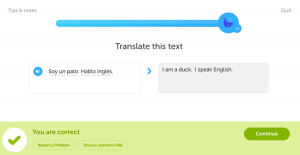

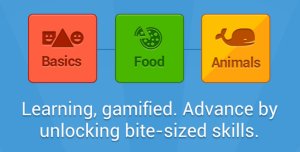


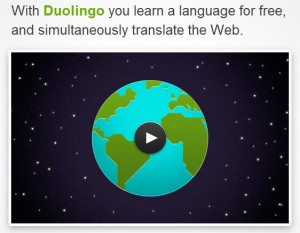


Hello, I am doing lessons of Duolingo for more than 2 years continuously; but I am not satisfied at all.
First of all:
1. This language learning is like a game where when you win they give you 5 points but when you lose, they will charge 40-200 points. Duolingo behavior is same, when we do lessons it usually give XP with every lesson, but now XP contribution is negligible.
2. From last many days I am noticing that either it’s remove just 2-3 seconds before the time is over or from last 10-15 days I noticed that even after alloting XP are not credited in the account.
3. For 15 minutes time to double the points 100 XPs are demanded. Even to do other lessons 30-80 XPs are charging.
4. There are many a mistakes in translation and many a times for 2-3 words of hindi translation one one word of English is there. To search other words more time than usual wasted on it.
5. There’s no link available to contact you in the program itself.
6. You reducing points without any information and suggestions. If one have to be at the top of the competitors then full day is required to waste on it.
7. Repetition of many sentences even in one lessons that are also which are too long- big cow, big dog, big mouse etc.
8. There’s no option to go to further stage, when one think that it’s getting boring. There should be some interesting lessons should be added and frequent changes should be made.
I think you will take it positively and do the necessary changes by making it remunerative in real sense and interesting. Thanks